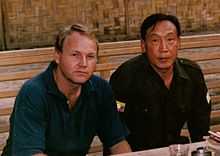Stephen Rice (journalist)
Stephen Rice (born 15 August 1957) is an Australian journalist, author and television producer. He has been a producer on Australia's 60 Minutes since 2004, following ten years as executive producer of the Nine Network's news and public affairs program, Sunday.
Career
Rice began his career in journalism with the investigative newspaper, The National Times, after graduating from the Australian National University in 1981 with degrees in law and arts. He joined The Sydney Morning Herald in 1984, covering national and state political and legal affairs. He was hired by Channel Nine's Willesee program in 1984 with a brief to investigate corruption in New South Wales. He became executive producer of A Current Affair in 1992.
He was appointed executive producer of Sunday and its sister show Business Sunday, in 1994 and ran both programs until 2004. He was also executive producer of the Nine Network's The Small Business Show.
In 2000 he was executive producer of The Dream Factory, an eight-part documentary series about young Australian actors trying to make their careers in Hollywood.
Rice is the author of the controversial Some Doctors Make You Sick: The scandal of medical incompetence.[1] The book caused an outcry in the medical profession as Rice called for more injured patients to sue their doctors – and provided them with a comprehensive how-to guide to do it.[2]
He has won numerous national and international television and journalism awards, including a Gold Medal in the New York Festivals Awards in 1998 for Saddam's Missing Billions, an international investigation (with Sunday host Jim Waley) into the Iraqi dictator's hidden fortune. He has twice won Walkley Awards for journalism: one for an exclusive interview with the Golden Triangle (Southeast Asia) heroin warlord Khun Sa in 1988 (a report he filmed himself on a Video 8 camera after illegally crossing the Burmese border by donkey); and the inaugural Walkley award for Excellence in News Leadership, in 1997.

He has been a vocal opponent of privacy laws which seek to restrict the rights of the media, particularly the use of cameras in public places[3]or which purport to ensure freedom of information but actually prevent it. [4]
He has spoken about the tension in current affairs television between chasing strong ratings and chasing strong stories: "Our credibility has a commercial value and we are in danger of squandering it." [5][6]
Rice’s decade-long battle to keep Sunday as a serious public affairs program is featured in Gerald Stone’s insider account of Channel Nine, Compulsive Viewing.[7] His removal as executive producer – and the subsequent reversioning of the program to what Stone describes as a “happy chat” format - is examined by Stone in his 2007 sequel Who Killed Channel 9?[8] Other senior Sunday staff - and host Jana Wendt - were later also removed by management. The program was axed in August, 2008.
References
- ↑ Rice, Stephen (1988). Some Doctors Make You Sick: The Scandal of Medical Incompetence. Sydney, Australia: Angus & Robertson. ISBN 0-207-15950-5.
- ↑ "Malpractice: Searching for a Remedy". The Age. 20 October 1988.
- ↑ "They'll soon be safe from candid cameras". Sydney Morning Herald. 13 June 2002.
- ↑ "Orwellian twist in right to information law". The Australian. 26 November 2012.
- ↑ "Tired track for current affairs". The Age. 31 October 2005.
- ↑ Rice, Stephen. Heresy in the Newsroom. The Walkley Magazine, July 1998.
- ↑ Stone, Gerald (2000). Compulsive Viewing. Australia: Penguin Books. ISBN 0-14-029817-7.
- ↑ Stone, Gerald (2007). Who Killed Channel 9?. Australia: Macmillan. ISBN 978-1-4050-3815-7.
External links
"Meet The Team: Stephen Rice". 60 Minutes, Nine Network Australia.